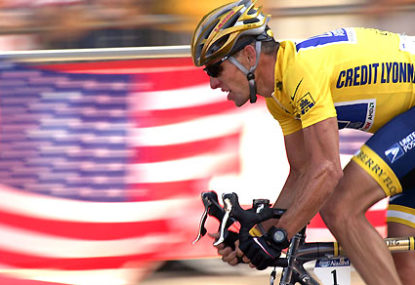'I've just won a stage of the Tour de France, mate!': Hindley grabs yellow jersey as Aussie blows Tour apart
Australia's Jai Hindley has said he is "lost for words" after a shock stage victory at the Tour de France earned him the leader's…

A recent ABC television debate on doping which pitted a pair of ex-sportsmen (the ‘no’ argument) against a pair of libertarian academics (‘yes’ case) highlighted the flaws in the pro-drug argument.
Swim legend Shane Gould and utility cultural flanker Peter FitzSimons were strident in a rejection of pharmaceutical fiddling, tapping into their own moral outrage and career anecdotes.
Professor Julian Savalescu and Dr Robin Willcourt, for the ‘dark’ side, brought little to the table but the spurious line that a sportsman’s physiology was his ‘tool of trade’ and therefore entitled to occasional tweaking.
They wanted sportsmen exempt – with qualified oversight – from many currently proscribed substances.
The pair’s conviction sounded a little stronger on the healing/repair paradigm than in the performance area.
They seemed to say a daily ‘recovery cocktail’ against marauding exercise metabolites was the sportsman’s equivalent of a nightly martini for those jaded, horny advertising execs from the TV series, Mad Men.
Echoing the case made for recreational drug advocates, they argued that prohibition forced supply underground, increasing the risk of toxicity accidents from dodgy sourcing.
It was, however, their endorsement of drugs as a palliative against increasingly elevated training loads that gave their opponents enough rope to hang them – or should have.
Unfortunately, as easily happens in debates, their opponents were not nimble enough to hoist the noose.
But if training demands are trending up – as seems plausible – this also means that as soon as a coping dosage is established, astute coaches will immediately crank them up again.
They wouldn’t be doing their job if they didn’t: after all, ‘progressive overload’ underpins all strength and fitness training.
It harks back to Milo of ancient Greece – the young man who mythically lifted a newborn calf above his head, and turned it into his daily challenge as the animal grew into a whole lot of bull.
The effect of palliative doping is to accelerate stress adaptation, allowing the coach to push more quickly to the next threshold. Therefore, any enhanced coping/adaptation simply throws petrol on the fire it was meant to dampen.
Like any unchecked arms race, technology is quickly matched by competitors. As in the U.S/ Soviet Cold War, a state of MAD (mutually assured destruction) eventually beckons.
But unlike the real Cold War when superpowers had the sense to pull back at the brink, the sporting world has already had at least one MAD event.
That was in the 80s when eight of the world’s top cyclists died in their sleep after the post-op miracle drug EPO hit the peloton.
Those riders should be publicly commemorated in some future museum of doping culpability, but too few know about them even now.
Their bloodstreams were so sticky with red cells that their hearts pushed treacle all night until they gave up.
Sooner or later, physiological systems and organs forced to metabolise supposedly ‘recuperative’ drugs must reach their limit and begin to fail.
The toll of sportsmen to have died from massive heart attacks in the last two decades is frightening.
Congenital? Or toxicity overload from substances supposed to help them perform or adapt? Thirty years ago the notion of a young sportsman dying from a heart attack would have been as strange as a musician dying of tone deafness.
Even in so-called supervised doping regimes, tests supposedly monitoring the health of subjects may not be up to the task of assessing the state of deeper regulatory metabolic pathologies.
Because of this lack of diagnostic sophistication, those pathologies may jump from a trace abberation to crisis very quickly.
The doping epidemic is making a mockery of many sports and regulatory bodies know it.
For every professional athlete who suffers serious health consequences there must be many other users who will never progress much beyond club level.
For this grade of sportsman to die for such low stakes is the greater tragedy. Their drug deaths can be as ignominious as a smack OD at The Cross.
As for the purely performance enhancing aspect, consider this. Sport is one of the few areas of life to bestow privilege without being born to it.
Sporting success should prove you’ve been honest enough to work for your kudos. But if the wider community suspects that honesty, why would you even want to take it up?
Anyway, here’s hoping that in another thirty years we’ll look back and shake our heads at a section of society that thought recreation justified pill popping, or that prosthetic testicles were a fair trade-off for looking buffed, or that the destruction of facial nuance with injections of plague bacilla was chic.